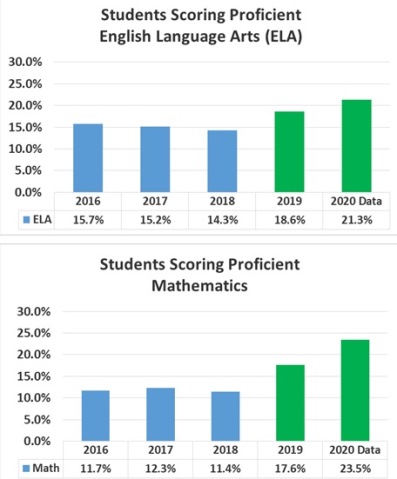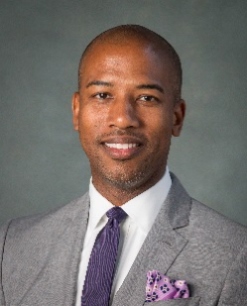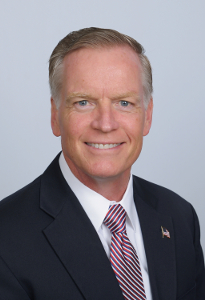
by Mary Rupert
Interim academic scores are up in the Kansas City, Kansas, Public Schools, according to Dr. Charles Foust, superintendent.
“We’re excited about our interim data,” Dr. Foust said Monday about the Kansas Assessment Program’s December scores.

English language proficiency scores are now at 21.3 percent, according to December KAPS scores, compared to 18 percent reported in October, and math scores are at 23.5 percent, compared to 17 percent in October, he said.
The latest interim assessment tests showed a growth of 2.7 percent for English language and 5.6 percent for math, he said. Last October, the scores had increased 4.3 percent in English and 6.2 percent in math.
Comparing 2017 to now, “it’s 10 percentage points higher than they were in 2017,” he said.
Dr. Foust attributed the increase in scores to an overhaul of teaching practice and rethinking how subjects are taught. The district has rewritten the curriculum and conducts ongoing training. The district is working with principals to implement the curriculum.
“We have really hit the ground hard with teaching the state standards and staying in focus with them,” Dr. Foust said. The district also is focusing on a pacing guide, making sure instruction keeps up with the state and knowing where the students should be at this time. They are making sure appropriate time is spent on a standard, he said.
The Kansas Learning Network has done a lot of work with the school district this year, according to Dr. Foust. The district sends and receives feedback from the state KLN, he added.
The state’s goal is for students to be at 75 percent proficiency by 2030.
“If we continue going at this rate we should be there before 2030,” Dr. Foust said.
The test scores help the district see that the students are making progress. He said it’s notable that students at the lowest level are making progress.
“Student learning is literally taking place at a higher rate now,” Dr. Foust said. The tests tell the district that what they are doing with the curriculum is working.
“We are teaching students and being successful,” he said. Eventually, students will be qualified for college and career readiness, able to select a college and career, he said.
The increase in test scores here is at a level that is higher than the average increase. Research from other school districts finds 4 and 5 percentage point increases within five years, but this 10 percent increase in Kansas City, Kansas, happened within 18 months, he said.
“To think about that astronomical growth just tells us what we’re doing is best for kids,” he said. “Kids are learning and they’re learning fast.”
Dr. Foust said he expected the test scores to continue to increase in the district, and there is room for much more improvement. Dr. Foust has a history of achieving higher test scores in districts during his career, one of the reasons the board hired him.
“Our district is one to watch around the state,” he said about the district’s academic growth rate. “We are outpacing in growth almost all the districts in the state of Kansas.”
He said the district wanted to show everyone that the students here have the capacity to learn, and the district is proud of it.
“We’re proud of the work we’re doing, and that parents are trusting us,” he said, “and we will continue to get them the best education that we can.”
Elementary schools’ scores increasing at highest rate
Elementary schools’ academic scores are increasing at the highest rate, he said, and there is some movement at the middle school level. High school rates haven’t improved as much as desired yet.
For high school students, the district will be filling in some areas that students may have missed earlier in their education, such as knowledge they have to learn to be successful in math classes. The district has identified high school students in need of tutoring and is preparing to start a tutoring program soon. Dr. Foust said he expected this level’s academic scores to have a “phenomenal” increase once the tutoring program is in place for high school.
According to school district information, 39 out of 43 schools showed positive gains in English language arts for 2018-2019 outcome data, and 40 out of 43 showed positive gains in math.
Schools that showed at least 10 percent growth in both English language arts and math were Hazel Grove, Quindaro, William Allen White, Whittier and White Church elementary schools.
The largest gain in English language arts was recorded at Hazel Grove Elementary, which increased 16.5 percent, according to district information. In math, the largest gain was 20.6 percent, recorded at White Church Elementary.
To reach Mary Rupert, editor, email [email protected].

